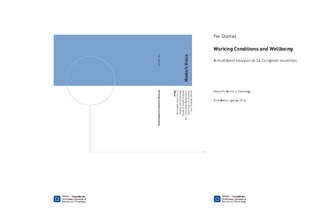Working Conditions and Wellbeing: A multilevel analysis of 34 European countries
Master thesis
Permanent lenke
http://hdl.handle.net/11250/268846Utgivelsesdato
2014Metadata
Vis full innførselSamlinger
Sammendrag
This paper studies the effects of working conditions on wellbeing in 34 European countries. The background for the study is an interest in work as a social determinant of health, in this case mental health as captured in the concept of wellbeing.
Working conditions are theorized at three levels. At the micro level, the psychosocial theories on stress and the work environment are reviewed; the demand-control-support model, effort-reward imbalance, organizational justice and emotional labour. The physical environment is also covered. At the meso level, social class is theorized as relational versus positional, and its relationship to the social gradient is discussed. At the macro level, two alternative typologies are compared. First, the typology of welfare state regimes based on Esping-Andersen (1990). Second, the typology of what I refer to as working conditions regimes, based on the Work Security Index (Rosskam 2009).
The thesis uses data from the European Working Conditions Survey. The technique of multilevel analysis is applied using a random intercept model, showing that around 5.7% of the variation in wellbeing stems from the national level.
The results show that psychosocial theories such as the demand-control-support model, effort-reward imbalance, organizational justice, as well as the physical environment all have a significant influence on wellbeing, while emotional labour does not. Occupational class has a significant effect for lower classes. At the national level, there are more significant differences between the working conditions regimes than among the welfare states regimes. In terms of effects sizes, the psychosocial models are about as influential as the working conditions regimes, while class appears to have relatively modest influence on wellbeing.
Working conditions regimes thus emerge as a viable alternative to welfare regimes when studying health related inequalities in the field of working conditions. The theoretical basis for the working conditions regimes is discussed, and there appears to be need for further theorizing and empirical research on this relatively new concept. Justice is proposed as a key framework influencing wellbeing at an institutional level, beyond the psychosocial. The thesis also argues that structural explanations to national differences in wellbeing are in need of further research.
